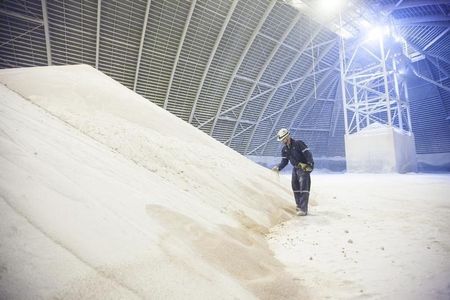By Rod Nickel
WINNIPEG Manitoba (Reuters) - The new chief executive officer of Potash Corp of Saskatchewan (TO:POT) says he will stick with the Canadian company's focus on supporting the price of potash by matching output of the crop nutrient to demand, rather than maximizing sales volume to fend off competition.
Profits at Potash Corp, the world's second-biggest potash producer, have dropped sharply as potash prices hit a six-year low earlier this year. The breakup nearly a year ago of global potash trading partnership Belarusian Potash Co (BPC) accelerated the slide in price, as it created more competition among producers.
"The principle and the strategy of aligning production with demand has been a very successful one, and so therefore the answer is, there's no reason to change that going forward," CEO Jochen Tilk told Reuters in an interview on Tuesday. Tilk, an engineer raised in Germany, replaced longtime Potash Corp CEO Bill Doyle on July 1.
Potash Corp sells potash outside North American through its Canpotex partnership with Mosaic Co (N:MOS) and Agrium Inc (TO:AGU).
Tilk said "your guess is as good as mine" on whether potash producers Uralkali OAO (MM:URKA) and Belaruskali forge a new BPC partnership, which could boost potash prices.
Tilk also faces the prospect of additional competition in his own backyard in Canada, as Germany's K+S AG (DE:SDFGn) and Anglo-Australian miner BHP Billiton PLC (L:BLT) build new mines in the province of Saskatchewan.
A former CEO of Inmet Mining, a now taken-over copper, zinc and gold producer, Tilk said it's too soon for him to outline specific plans for Potash Corp. But he said lowering operating costs is a priority, as that would leave the company well-positioned for a conservative demand scenario while maintaining idled capacity that would be available if markets heat up.
Global expansion of potash mining capacity, led by Potash Corp's own decade-long buildout, has exceeded the pace of demand growth, adding further pressure to prices.
In December, the company said it would slash its workforce by 18 percent as it struggled with slumping demand and weak prices. It has since recalled nearly 100 workers due to tight conditions in the granular potash market.
Tilk said that although it has surplus capacity, the company is committed to completing the last piece of its potash expansion next year, with less than $1 billion still to spend on the program. Once it's complete, Potash Corp should have more free cash flow, and Tilk said the company will look at whether to use it to buy back shares, increase its dividend or for other purposes.
Examining internal opportunities to grow is a bigger priority than making acquisitions, he said.
"The No. 1 focus right at this point in time, the priority is, really, look at Potash Corp and the organic opportunities that we have."
The company owns minority stakes in three other potash companies: Israel Chemicals Ltd (TA:ICL), Chile's SQM (SN:SQMa) and Arab Potash Co PLC (AM:APOT). Former CEO Doyle abandoned efforts to take over ICL last year because of strong opposition in Israel.
Those equity stakes will have to prove they can create value for shareholders, Tilk said.

"If that's indeed the case, they're great investments. If it turns out they don't create that value, at least not in the setting they are, then the company has to look at that."
Doyle will stay on as a senior adviser to Tilk through June 2015.
(Reporting by Rod Nickel in Winnipeg, Manitoba; Editing by Peter Galloway)
